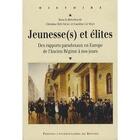-
Date de parution : 21/01/2002
-
Editeur :
Peter Lang Ag
-
EAN : 9782807605206
-
Série :
(-)
-
Support :
Papier
Résumé:
Do the politicians actually take decisions, or rather the experts do it in their place? In other words, it is a matter of understanding whether the political stakeholders/representatives simply approve the final stage of a decision procedure led by the experts they have delegated, since they... Voir plus
Do the politicians actually take decisions, or rather the experts do it in their place? In other words, it is a matter of understanding whether the political stakeholders/representatives simply approve the final stage of a decision procedure led by the experts they have delegated, since they lack cognitive skills or because the experts do not try enough to explicit potentials and risks involved. Here lays the possible loss of democratic legitimacy in the decision-making process. This brings into question the responsibility of a ruling class to which the political representatives and secondarily the experts belong. This book analyses the interplay of these different actors in the political relations among States since the 1960s: this interaction capability becomes a key factor for the international accountability of a country, and above all for the democratic reliability of its decision-making process. Then we have to consider the role of the organized civil society. In that way, expertise provides the basis for the mediation among the States, and then expertise goes for the legitimacy of power practices in all parties engaged, and in the decision-making process inside the democratic arenas.
Donner votre avis









